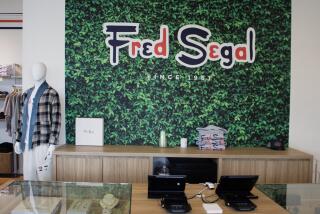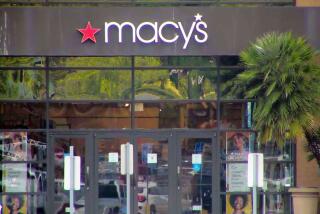A Macy’s Buyout of Federated Could Cause Culture Clash
- Share via
Among his retailing peers, Edward S. Finkelstein, chairman of R. H. Macy & Co., has earned two labels: merchant prince and autocrat.
Since taking charge of Macy’s in 1980, he has won a reputation as an undisputed retailing leader, with a fondness for panache and theatricality. As a manager, observers say, he is hard driving and hands on, with a tendency to make the important decisions himself.
With the news this week that Macy’s might take over sprawling Federated Department Stores, Finkelstein could soon influence shopping and working at department stores all over America.
Customers from Bullock’s in Los Angeles to Filene’s in Boston could see the merchant flash and aggressive price-cutting that Finkelstein has made hallmarks at Macy’s. And the 133,000 employees of Federated--clerks, buyers, managers, store presidents--might be forced to come to terms with Finkelstein’s intensity.
Should Macy’s prevail in its $6-billion battle with Toronto developer Campeau Corp., there is a culture clash brewing of major proportions.
Perhaps no major-league retailer stands in as much contrast to Finkelstein as Howard Goldfeder, the chairman of Federated Department Stores. For years, he has taken a decentralized approach, giving a great deal of autonomy to the company’s far-flung divisions and letting them react to their markets as they see fit.
“Centralization versus decentralization. That’s the key difference,” said Thomas H. Tashjian, vice president of retail at Seidler Amdec Securities, a Los Angeles investment house.
“Macy’s has always been a very sweatshop kind of operation,” said Ann C. Hunt, a partner in the retail practice of Korn/Ferry International, an executive search firm in New York. “It’s a very hard-driving, very confrontational work environment.
Goldfeder has said he would resign after staying through a transition period. That would leave Finkelstein in charge of a much larger company whose employees have been afforded a large measure of autonomy.
“What will become interesting is the strategy that the acquiring firm chooses to pursue in terms of integrating the acquired firm,” said Caren Siehl, an assistant professor of management at USC. “Culture clash is most significant when the acquiring firm wants to completely integrate the other. They want the acquired firm to be just like them, to have the same system and culture.
“If they back off from that complete integration, then the culture clash will be less critical.”
Carl Steidtmann, vice president and chief economist of Management Horizons, a consulting firm, figures that Macy’s might be sensitive to the potential for trouble and keep Federated’s decentralized approach, allowing “multiple cultures within the company.”
A former Macy’s executive sees that as unlikely. “Macy’s probably would add only a small group of managers to its New York headquarters and eliminate all of Cincinnati,” he said. In terms of cost savings, “that probably would be a good idea.”
In the near term, the companies must deal with the concerns of employees, particularly at Federated, who realize that “economies of scale” frequently translate into layoffs and upheaval. In such cases, employees fear that when the other shoe drops, it could easily be in the form of a pink slip.
To some employees, a takeover by Macy’s is still preferable to a purchase by Campeau Corp., the hostile suitor that started Federated down the road to merger. The Toronto development firm’s chairman, Robert Campeau, dismantled a previous retailing acquisition, Allied Stores, and eliminated thousands of jobs.
(The uncertainty is compounded for workers at Ralphs Grocery in Compton, Federated’s lone food division. That company is officially on the block, and the lead bidders reportedly are Ralphs management and Lucky Stores of Dublin, Calif. Observers figure that massive layoffs could result should Lucky emerge the winner.)
For now, observers figure that Macy’s will do its best to preserve as many Federated jobs as possible. But, noted analyst Tashjian, “there is divisional duplication of operational and administrative support that does not exist at Macy’s but does exist at Federated.” Layoffs, he indicated, would be inevitable.
Some Federated employees might not adjust well to the lack of autonomy under Macy’s rule even if they stay on.
More Layered
“I would say that the Federated culture has been more layered,” Hunt added. “When you reach the top ranks there, you have some perquisites that go with that. There could be an acclimation period there.”
In a way, there’s no better time to attempt to change a culture than during the upset of a merger, according to one management consultant.
“Everybody’s saying, ‘Who’s my boss today? What will happen tomorrow?’ ” said Morty Lefkoe of Lefkoe & Associates in Westport, Conn. “A merger creates the kind of environment in which it’s relatively easy to create a new culture because it’s chaos anyway.”
And to some, Macy’s more centralized approach bodes well for Federated’s operations.
“When you work for a Federated department store, you never get the sense you’re working for Federated,” said a former Abraham & Straus employee. “You get the sense of working for that division. You don’t feel you have much in common with other divisions, and that’s definitely bad.”
Finkelstein, who turned 63 this week, bridles at the suggestion that Macy’s has strictly a from-the-top-down approach. He prefers to describe the Macy’s style as “federalized decentralization.”
“We encourage a great deal of decentralization,” he said in an interview Wednesday, after Macy’s announced its agreement to take over Federated Department Stores. “We also encourage a lot of centralization for the common benefit.
Important Trait Shared
“We don’t think of ourselves as a centralized operation at all. On the other hand, anarchy doesn’t run free.”
Interestingly, Hunt said, neither company’s executives win unqualified kudos from other retailers in need of talent. “There is not a great demand for both Macy’s and Federated executives because of a lack of interpersonal skills,” she said. Others retailers, such as Dayton Hudson, Allied Stores and Dillard’s Department Stores, she added, are better spots to shop for rational managers capable of bringing people to a consensus.
For customers, the companies’ most visible difference is how the two companies merchandise.
“There’s an incredible difference in how the two perceive the correct level of inventory,” said Carol Farmer, a New York retailing consultant. “Macy’s thrives on being stuffed to the rafters with the broadest and deepest assortments. Federated has prided itself on being incredibly edited and almost sparsely merchandised.
“I would think it would be a tough thing for the merchants at Federated, if they stay, to suddenly deal with that.”
But Farmer foresees that “some synergy could be gleaned” in a merger, with Macy’s benefiting from Federated’s “fashion authority” and Federated from Macy’s presentation skills.
Macy’s and Federated do share an important trait that could make for smoother going in a transition, Hunt of Korn/Ferry said.
“They’re both fabulous merchants,” she said. “I think merchandise is king, still, in both operations. In that sense, it would be an interesting fit. But in terms of the power play between some of the egos, I don’t know how that would fall out.”
At Bullock’s, executives are hoping that their chain’s top-ranking performance at Federated will put it in good stead with a new management team.
Merger Syndrome
“I see Bullock’s and Macy’s as being very, very much in harmony,” said Jack McCarley, Bullock’s vice president of public affairs. “The philosophy we’ve had with (former Chairman Allen I.) Questrom of upgrading and beautifying our stores and continuing to offer better-quality merchandise meshes with what Mr. Finkelstein is doing in Macy’s San Francisco and New York.”
Maybe so, but Macy’s changed the name of its Bamberger’s chain in the Northeast to Macy’s after a confusing effort at joint television advertising. And its Davidsons stores in Atlanta became Macy’s Davidsons, and ultimately the Davidsons name was dropped altogether.
A longtime Bullock’s employee confided fears that Macy’s, which has been trying for years to enter the Southern California market, would scarcely pass up the opportunity to have its name on the doors of some highly regarded stores.
Such worker concerns are part of “merger syndrome,” said Caren Siehl, an assistant professor of management at USC. “That employee’s peers may spend the next three years sitting around, talking over lunch about what’s going to happen next,” she said.
“The syndrome involves employees coming to grips with a loss of identity. The company they once worked for no longer exists. Employees often describe it as a feeling of waiting for the other shoe to drop.”
More to Read
Inside the business of entertainment
The Wide Shot brings you news, analysis and insights on everything from streaming wars to production — and what it all means for the future.
You may occasionally receive promotional content from the Los Angeles Times.











